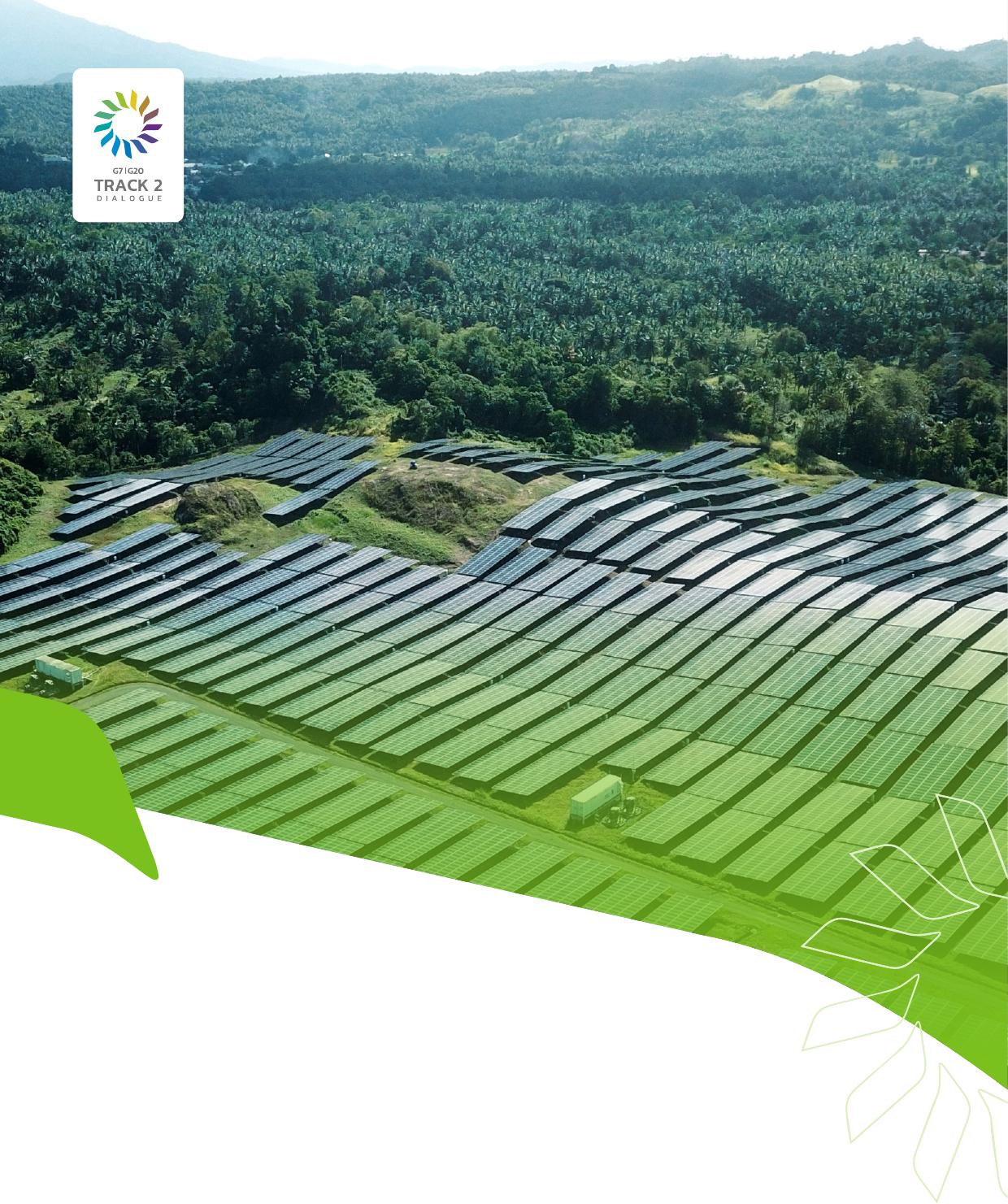BackgroundPaperAccelerationoftheEnergyTransitioninIndonesiaAchievinganequitabletransitionthroughtheJustEnergyTransitionPartnershipandotherFinancingStrategiesAuthor:HenrietteImelda(IRID)Contributors:AnnPhang,AlexandraGoritz,FelitaPutri,FelixF,GiovanniMauricePradipta,PetterLyden(Germanwatch).LayoutDesign:MaginateCreativeCommunicationPhotoCoverCredit:©HardyMynhart/ShutterstockSolarpowerplantpanelinLikupangIndonesiaBackgroundPaperAccelerationoftheEnergyTransitioninIndonesiaAchievinganequitabletransitionthroughtheJustEnergyTransitionPartnershipandotherFinancingStrategies2AccelerationoftheenergytransitioninIndonesiaOneoftheinitiativesthatemergedfromthe26thannualmeetingoftheUnitedNationsFrameworkConventiononClimateChangeConferenceoftheParties(COP)heldin2021inGlasgow,UK,wastheJustEnergyTransitionPartnership,orJETP.JETPisaformoffinancialfundingprogrammethatwasinitiallycreatedasapartnershipwithSouthAfrica,supportedbythegovernmentsofFrance,Germany,theUnitedKingdom,theUnitedStates,andtheEuropeanUnionasmembersoftheInternationalPartnersGroup(IPG).AvitalfeatureoftheJETPistheemphasisonanequitableshiftinitsinvestmentplansandfinancing.TheJETPwithSouthAfricaisexpectedtoserveasamodelthatcanbereplicatedinotherdevelopingcountries,especiallythosehighlydependentonfossilfuelsforeconomicdevelopment.AtG20Summit,inBali,Indonesia,thepartnershipprogrammewaslaunchedforIndonesia,withUS$20billioncombinedpublicandprivatefinancing.Similarly,aVietnameseJETPwasannouncedinDecember2022,withavalueworthmorethanUS$15billion.TotakeadvantageofJETPandotherfundingopportunitiesforIndonesia,thecountrymustidentifywhatitneedstoenabletherightenvironmentforcooperationthatdoesnotviolateapplicableprinciples.Simultaneously,Indonesiamustencourageambitiousandproperuseoffundingtoacceleratetheenergytransitiontowardsfossil-freealternatives.©BastianAS/ShutterstockWindfarmturbineinstalledinJenepontoRegency,SouthSulawesi,Indonesia3BackgroundPaperIndonesia'senergytransitionplanIndonesiaexpresseditscommitmenttosupporttheParisAgreementthroughitsfirstNationallyDetermined1Contribution(NDC),whichstatesthatIndonesiawillreducegreenhousegas(GHG)emissionsthroughitsowneffortsby29%.However,withinternationalassistance,IndonesiacanachieveGHGemissionreductionsof41%.Indonesiaalsoexpresseditswillingnesstosupportjointeffortstopreventtheincreaseintheglobalaveragetemperaturefromexceeding2°C,evenstrivingnotto1DistributionofCancelledCoalPowerPlantProjectsAsPartofTheEnergyTransitionPlanFigure1Distributionofcancelledcoalpowerplant(PLTU)projectsaspartoftheenergytransitionplan(Wanhar,2022)TAKEOUTPLTUPLTUSumut-22x300MWPLTURiau-12x300MWPLTUBintan2x100MWPLTUBanyuasin2x120MWPLTUSumsel-6300MWPLTUMT(Ekspansi)350MWPLTUBangka-1A2x50MWPLTUBelitung-22x15MWPLTUEkstension300MWPLTUJawa-51.000MWPLTUBanten660MWPLTUIndramayu1.000MWPLTUKalbar22x100MWPLTUKalbar32x100MWPLTUKalseltang42x100MWPLTUKalseltang32x100MWPLTUKaltim32x100MWPLTUKaltim52x100MWPLTUKalseltang5100MWPLTULombok22x50MWPLTULombok42x50MWPLTULombok32x50MWPLTUSumbawa22x50MWPLTUTimor22x50MWPLTUToli-Toli2x25MWPLTUSulbagut22x100MWPLTUSulbagut32x50MWPLTUHaltim200MWPLTUSorong32x25MWPLTUAmbon2x25MWPLTUWaai2x15MWPLTUSulbagsel22x200MWPLTUSulbagsel2x200MWPLTUBau-Bau22x15MWPLTUBau-Bau2x15MWPLTUJayapura350MWPLTUJayapura250MWTONSCO₂/YEAR8.770MW64.5million1On23September2022,IndonesiaissueditsEnhancedNationallyDeterminedContribution(ENDC),inwhichitpledgedtoreduceitsgreenhousegasemissionsby31%byitsownefforts,and43%withinternationalsupport,by2030.2IntheENDC,thetargetforreducinggreenhousegasemissionsintheenergysectoris358-466milliontonnesCO2-eqexceed1.5°C.Indonesia’sfirstNDCaimstoreduce2around314to446milliontonsofCO2-eqby2030bydevelopingrenewableenergy,implementingenergyefficiencymeasuresandconversion,andinstallingcleanenergytechnology.Todoso,atotalof8,770MWofcoal-firedpowerplantprojectshavebeencancelled,withanestimatedGHGemissionreductionequivalentto64.5milliontonsofCO2/year(DJK,2022)(seeFigure1).ThecalculationshowninFigure2considersthefollowingpoints:ThecalculatedcoalpowerplantcapacityincludesexistingandactivecoalpowerplantsinallPLNandnon-PLNoperatingareas.Theincreaseincoalpowerplantcapacityfollowstheprojectslistedintheelectricitybusinessplan(RencanaUsahaPenyediaTenagaListrik(RUPTL)).Theretirementofcoalpowerplantssignificantlyreducesemissionsfromthepowergenerationsector.ThelifetimeofPLN'scoalpowerplants,accordingtoassetrevaluationandaPPU,isamaximumof30years,whereasforIPPs,itis25to30years,accordingtothePowerPurchaseAgreement(PPA).Figure2alsoprovidesanoverviewofthepreparationwhenphasingoutandretiringcoalpowerplants:Thelegalbasis(intheformofgovernmentregulationandpresidentialregulation)willneedtobecreatedsothattheretirementcanbecarriedoutbybusinessentitiesandissustainableuntilcompletion.PhasingoutPLN'scoalpowerplantbefore2046requiresthoroughstudybecausethereisanissueofrevaluationoftheassets.IPPcoalpowerplantsareonlyinoperationuntiltheendofthePPAandarenon-extendable.CoalpowerplantsoutsidethePLNworkingareaandcoalpowerplantslicensedtosupplyelectricityforbusinesses’ownuse(IUPTLS)mustfollowthephasingoutprogramme.NotaddingnewcoalpowerplantsexceptthosealreadylistedintheRUPTLappliestoallbusinessareasandplantslicensedtosupplyelectricityforbusinesses’ownuse(IUPTLS).CoalPowerPlantRetirementScenarioPLNhastakenintoaccountanassetrevaluationwithaplantlifetimeextensionof30to40yearssince2016Note:IUPTLS:IzinUsahaPenyediaanTenagaListrikuntukkepentinganSendiri(BusinessLicenceforOwnElectricityProduction);PPU:privatepowerutilitycompany;IPP:independentpowerproducer.Inadditiontothecancellations,thestateelectricitycompany(PLN)mustalsoconsidertheretirementofcoalpowerplants,asshowninFigure2.IUPTLS(Captive)PPUIPPPLNNatural70605040302010585960595857565655545352525249494843302828262220181716152100-GW42444748505356Figure2Coalpowerplantretirementscenario4AccelerationoftheenergytransitioninIndonesiaTheMinistryofEnergyandMineralResources(MEMR)hasdevelopedthreescenariosforcoalpowerplantretirement:theBusinessasUsualScenario,theZeroEmissionScenario(ZES),andtheNetZeroEmission(NZE)Scenario.ToachieveNZEintheenergysectorby2060,netemissionsinthegenerationsectormustreachzero.Inthisregard,theZEShasbeenselectedforimplementation.ToachievetheaforementionedZES,thefollowingshouldbedone:Coal/combinedcyclegasturbinepowerplants:additionalcoalpowerplantscanonlybecompletedintheconstructionperiod.IPPcoalpowerplantswillberetiredaftertheendofthePPA,whilecombinedcyclegasturbinepowerplantswillberetiredafter30years.Renewableenergy:additionalelectricitygenerationafter2030willonlybefromrenewableenergy.Solarenergywillstartbeingdevelopedfrom2030,followedbybothonshoreandoffshorewindpowerin2037.Geothermalpowerplants:outputwillbegraduallymaximisedto22GWthroughthedevelopmentofanadvancedgeothermalsystemandothernon-conventionalgeothermalsystems.Hydropower:thiswillbeoptimisedandtheelectricitysenttoloadcentresonotherislands.Hydropoweralsoprovidesbalancebyactingasabaseload/servicegapfillerforrenewableenergyplants.Nuclearpowerplants:gradualoperationwillstartin2039tomaintainsystemreliability.By2060,nuclearpowerplantsareexpectedtoreach31GW.Storage:pumpstorageimplementationwillstartin2025.Batterystorageisexpectedtobeginin2034.Meanwhile,hydrogenproducedfromrenewableelectricity(GreenHydrogen)willstartin2031forthenon-generationsector.TheMEMRalsonotedthattheinvestmentneedsforgenerationandtransmissiontowardsNZEutilisingtheZESintheenergysectorwouldreachUS$1,108billionin2060,ofwhichUS$995billionwillbeforgenerationandtheotherUS$113billionfortransmission.ThismeansthatIndonesianeedsUS$28billionannuallytoachieveNZEintheenergysector.5©cpaulfell/ShutterstockLargecoalfiredpowerplantinIndonesiaBackgroundPaperThereadinessofIndonesia'srenewableenergysectorIndonesiahasenormousrenewableenergypotential.Thereisanestimated3,686GWfromsolar,hydro,bioenergy,wind,geothermalandmarinesources.However,Indonesia'sutilisationofrenewableenergyisminimal,at11,612MWasofJune2022,oraround0.3%ofthetotalpotential(IswahyudiandKusdiana,2022).Note:RealisationinJune2022.Nuclearpotential:Uranium89,483tonsandThorium143,234tons9109561,0211,0641,0841,0891,123ThePotentialofNewandRenewableEnergyinIndonesiaElectricityConsumptionUnit:kWh/CapitaCovid-19PandemicPeriod2015201620172018201920202021NEWANDRENEWABLEENERGYPOTENTIALANDUTILISATIONENERGYSOURCESolarHybridBioenergyWindGeothermalOceanPOTENTIAL(GW)UTILIZATION(MW)Total3,295955715524603,6862216,6602,2841542,293011,6126AccelerationoftheenergytransitioninIndonesiaFigure3PotentialofnewandrenewableenergyinIndonesia(IswahyudidanKusdiana,2022)Indonesiahaslarge,dispersed,anddiversenewandrenewableenergypotentialtoboostnationalenergysecurityandachievetheNREtargetintheenergymixtargetsWith0.3%ofthetotalpotentialalreadyutilised,thereisahugeopportunityfornewandrenewableenergydevelopment,especiallyduetotheenvironmentalissues,climatechange,andtheincreasingelectricityconsumptionpercapita.“HydropotentialiswidespreadthroughoutIndonesia,especiallyinKaltara,Aceh,WestandNorthSumatera,andPapua.SolarpotentialiswidespreadthroughoutIndonesia,especiallyinEastNusaTenggara,WestKalimantan,andRiau,allofwhichhavehighsolarradiation.Windpotential(>6m/s)isfoundinEastNusaTenggara,SouthKalimantan,WestJava,Aceh,SouthSulawesi,andPapua.OceanenergypotentialiswidespreadthroughoutIndonesia,especiallyinMaluku,Bali,andEastandWestNusaTenggara.GeothermalpotentialisfoundintheringoffireregionsincludingJava,Sumatera,Bali,NusaTenggara,Sulawesi,andMaluku.7BackgroundPaperRenewableenergydevelopmentmustbecarriedoutevenmoreextensivelyforIndonesiatoachieveits3GHGreductiontargetofNZEin2060orearlier.TheEBTKEestimatesthatin2060,toreachNZE,electricitygenerationfromnewrenewableenergywillbesplitasfollows:421GWfromsolarpower,94GWfromwind4power,72GWfromhydropower,60GWfrombioenergypower,31GWfromnuclearpowerplants,22GW56fromgeothermalpower,and8GWfromtidalpower.Meanwhile,storagetechnologywillconsistof4.2GWofpumpedstorageand56GWofbatterystorage.800700600400200500300100CoalDieselBioenergyWindNuclearStorageGasGeothermalHydroSolarOcean202220252030203520402045205020552060403268125193278382421-Intermsofinfrastructure,Indonesianeedstostrengthenitsexistinggrid.ThenationalgridisacrucialfactorforNZEinthegenerationsector,especiallywiththeplantointegrateinter-islandgrids.Figure4GenerationcapacityunderNZEconditionsin2060(GW)(IswahyudidanKusdiana,2022)NZEPowerGenerationCapacityGW821001521992833895096377083TheDirektoratJenderalEnergiBaruTerbarukandanKonservasiEnergi,knowninEnglishastheDirectorateGeneralofNewRenewableEnergyandEnergyConservation,isasuborganisationdirectlyundertheMEMR.4Thenuclearpowerplantisexpectedstartoperatingin2039andtocomeonlinein2040,(IswahyudiandKusdiana,2022).5Tidalpowerplantsareexpectedtobecommissionedaround2055,andby2060areexpectedtoreach8GW.6Large-scalestorageisexpectedtobeavailablein2031.8AccelerationoftheenergytransitioninIndonesia9©RezkyPurnama/ShutterstockGeothermalpowerplantsthatarefullyutilisedbylocalresidents,Dieng,CentralJava,Indonesia.BackgroundPaperFigure5Developmentofelectricityinfrastructure(Iswahyudi,2022)NationalBioenergyGeothermalHydroSolarWindCapacityin2060(GW)TOTAL60227242194831708NuclearOceancurrentsColorType70kv150kv275kv500kvExistingPlanNZE(Supergrid)Note:JAMALIMPNTASEANA.HavebeenincludedintheRUPTLprojectlist:150kVSumatera-BangkaInterconnection(2022);500kVSumatera-MalaysiaInterconnection(2030),supportingASEANpowergridcooperation;150kVKalimantanInterconnection(2023);150kVSulbagut-SulbagselInterconnection(Tambu-BangkirCOD2024).1.2.3.4.DevelopmentOfElectricityInfrastructureSupergridisthekeyfactortoachieveZeroEmissioninpowersectorMalaysiaASEANPowerGridSingapuraASEANBintan202720506471020352035202920529638122044KALIMANTANBioenergyGeothermalHydroSolarWindNuclear100,254691726Cap(GW)TOTAL175MPNT6127116Cap(GW)TOTAL96BioenergyGeothermalHydroSolarWindSULAWESIBioenergyGeothermalHydroSolarWind9352711Cap(GW)TOTAL54BioenergyGeothermalHydroSolarWindOceancurrents1683109401178TOTALJAMALICap(GW)BioenergyGeothermalHydroSolarWindOceancurrentsNuclear19981461076TOTAL205SUMATERACap(GW)20452044204620562036204920522028204620562056B.IncludedintheRUPTLdraftbutneedfurtherreview:Sumatera-SingaporeInterconnection(includingSumatera-Bintaninterconnection),tosupportASEANpowergridcooperation,furtherriviewisrequired;5.500kVSumatera-JavaInterconnection(furtherreviewisrequiredbytakingintroconsiderationdemandandsupply);6.150kVBali-LombokInterconnection(furtherreviewisrequi-redtosupporttheJava-NusaTenggarainterconnectionplan);7.150kVBangka-BelitungInterconnection(furtherreviewisrequiredtosupporttheSumatera-Kalimantaninterconnectionplan);8.9.Belitung-Kalimantaninterconnection(furtherreviewisrequiredasaportoftheSupergridNusantaraprogram);10.150kVBaubau-SulbagselInterconnection(furtherreviewisrequiredtoimprovethereliabilityofBau-Bau).InterconnectioninvestmentwilldecreaseifRenewableEnergyBasedIndustrialDevelopment(REBID)isimplemented:Java-Madura-Bali:Maluku-Papua-NusaTenggara:AssociationofSoutheastAsianNation10AccelerationoftheenergytransitioninIndonesia5EnablingconditionsforanequitableenergytransitioninIndonesiaPoliciesthatenableconditionsforanequitableenergytransitionareessentialforphasingoutfossilfuelsanddevelopingtherenewableenergysector.AsidefromIndonesia'scommitmenttosupportingtheParisAgreement,asstatedinIndonesianBillNo.16/2016,Indonesiamustalsocreateotherenablingconditionssothatthetransitionfromfossilfuelstorenewableenergytechnologiescanrunwell.2SomeoftheenablingconditionsthatcanformthebasisforIndonesia'senergytransitionareasfollows:ThegovernmentofIndonesiasubmittedanENDCdocumenton23September2022,withatargetofreducingGHGemissionsthroughthecountry'sowneffortsby31.89%,andby43.20%withinternationalsupport.ThereductionofGHGemissionsintheenergysectorthroughitsowneffortsisexpectedtoreachaminimumof358milliontonsofCO2-eq,upfromthepreviousestimateof314milliontonsofCO2-eq.TheLong-termStrategyforLowCarbonandClimateResilience2050aimstowardsanNZEstateby2060orsooner.ThroughtheFinancialServicesAuthority(OtoritasJasaKeuangan,2022),IndonesialaunchedtheGreenTaxonomyin2022.ThisGreenTaxonomyisexpectedtosupporteffortstoprotectandmanagetheenvironmentaswellasmitigateandadapttoclimatechange.Indonesialaunchedthe2022PresidentialRegulationnumber112on13September2022toacceleraterenewableenergydevelopment.ThismandatestheMEMRtopreparearoadmaptolimittheoperationalperiodofcoalpowerplantsandtheprohibitionofnewcoalpowerplantdevelopmentsunlessitfulfilscertainexceptionalconditions.Thesameregulationalsostatesthatthegovernmentcanprovidefiscalsupportthroughafundingandfinancingframework,includingblendedfinancesourcesfromthestatebudgetandotherlegitimatesourcestoacceleratetheenergytransition.IndonesiaiscurrentlydraftingaNewEnergyandRenewableEnergyBill(RancanganUndang-UndangEnergiBarudanEnergiTerbarukan(RUUEBET))tostrengthentherenewableenergysectorinIndonesia.ThegoaloftheRUUEBETwillbeto:providelegalcertaintyfornewandrenewableenergydevelopmentinIndonesia;strengthentheinstitutionalframeworkandgovernanceofnewandrenewableenergydevelopmentinIndonesia;createaconduciveinvestmentclimatefornewandrenewableenergyinvestors;andoptimisenewandrenewableenergyresourcestosupportnationalindustrialandeconomicdevelopment.11BackgroundPaperLeveragingfinancefortheenergytransitioninIndonesiaIndonesia'senergytransitionplantomoveawayfromfossilfuelpowerplants,suchascoal,requiresconsiderablefunding.BasedonMEMRcalculations',IndonesianeedsatleastUS$28billionannuallytoabandoncoalanddecarboniseby2060.Thisonlyaccountsforcoal-basedelectricitygenerationandtransmission.However,thedevelopmentofrenewableenergyasanewenergysourceandthesocioeconomicimpactscausedbythistransitionremainunaccountedfor.Severalfinancialtoolsarecurrentlygearedtowardsfundingtheenergytransition,particularlytheshiftfromcoaltorenewableenergy.TheJETPisonefundingmodelpresentlyreceivingmuchattention.Otherfundingplatforms,suchastheClimateInvestmentFund,arealsoavailableforIndonesiatodecarbonise.ThequestionstoaddressarehowIndonesiawillimplementthesefundsandwhatrestrictionsthisinternationalaidshouldadhereto,tohelpIndonesiashiftfromfossilfuelstorenewableenergywithoutcausinganyharm.31.CurrentfundinginitiativestosupportIndonesia'sJustEnergyTransitionCurrently,twofundinginitiativesarebeingdiscussedforimplementationinIndonesia.ThefirstistheEnergyTransitionMechanism(ETM),whichcomesfromtheClimateInvestmentFundchannelledthroughtheAsianDevelopmentBank.ThesecondistheJETP,afundingmodelsimilartotheJETPinSouthAfrica.12AccelerationoftheenergytransitioninIndonesia©HerwinBahar/ShutterstockTurbineonthehillforenergygeneration,Sidrap,IndonesiaAnnouncedatCOP26Glasgowin2021,theETMSoutheastAsiaPartnershipisthefirstfinancialprogrammeofitskindintheAsia-PacifictoaccelerateSoutheastAsia'stransitiontocleanenergy.ETMhasablendedfinanceapproachtoretirecoal-firedpowerplantsandacceleratetheirretirementschedule,replacingthemwithplantspoweredbycleaneralternatives.Apartfromtheearlyretirementofcoal-firedpowerplants,themechanismalsoallowstherepurposingofplantsinafastertimeframe.Thisinstrumentfocusesoncleanenergyinvestmentsingeneration,storageandgridperformance.Contributionsfromdevelopmentbanks,privateinvestors,philanthropistsandlong-terminvestorswillprovidethecapitalfortheETM.TheAsianDevelopmentBank'simplementationofETMwillsupportnationalgovernmentstofinaliserelevantpoliciesandbusinesses,therebyimprovingprogrammeEnergyTransitionMechanismJustEnergyTransitionPartnershipAtCOP26inGlasgow,UK,in2021,theSouthAfricangovernment,togetherwiththegovernmentsofFrance,Germany,theUnitedKingdom,theUnitedStatesandtheEuropeanUnion,alsoknownastheIPG,announcedapartnershipcalledtheJETP.TheSouthAfricanJETPisanefforttomobiliseUS$8.5billionoverthenextthreetofiveyearstoassistSouthAfricainitsdecarbonisationefforts.TheJETPemphasisesanequitabletransitioninthestructureoftheinvestmentplananditsfinancingcomponent(UKCabinetOffice,2022).TheJustEnergyTransitionInvestmentPlan(JETIP)ofSouthAfricawaspublishedinNovember2022andprovidesdetailedinformationaboutthetimeframe,targetsanddistributionoftheUS$8.5billionfund(ThePresidencyRepublicofSouthAfrica,2022).AfundingmechanismsuchastheJETPisexpectedtobeappliedtootherdevelopingcountrieswithenergy-intensiveeconomies.Thismechanismexplicitlydemonstratesthatdevelopingcountrieswithenergy-intensiveeconomiesincorporatetheirdecarbonisationgovernance,emissionsreductions,andequitabletransitionobjectives.Mostrecently,atthe2022G20summit,IndonesiaannouncedtheirETMCountryPlatform,wherePTSMI,astate-ownedenterprise,willactasthefundmanagerforallfundingrelatedtoanequitableenergytransitionintheformofblendedfinance.TheywillbesupportedbythethinktankClimatePolicyInitiative,whichwillconductpolicyanalysis,stakeholderconveningandproviderecommendationstoensureacleanenergytransition.TheETMCountryPlatformisdesignedtohavetwotypesoffunding:CleanEnergyFundtofundrenewableenergyprojectsandCarbonReductionFundtofundcoalphase-out.Thefirstcoalpowerplanttoberetiredunderthisinitiativewillbethe600MWCirebon-1coal-poweredsteamturbinepowerplantinWestJava.commitmentsintotheirNDCs.Toachievethis,developedcountriesprovidefundstosupportdevelopingcountriesinimplementingtheirdecarbonisationefforts.Thesuccessofthiscooperativemechanismwillindicatethatanequitabletransitionisfeasibleandfundableandcanbeacatalystforinclusivedevelopment,wherenooneisleftbehind.AttheBaliG20SummitinNovember2022,itwasannouncedthat,forIndonesia,theJETPwouldallocateUS$20billioninfundingwhiletheETMwouldallocateUS$500millioninconcessionalfunding(MinistryofFinance,2022).ConcerningtheJETP,theUS$20billionfundingwillbemobilisedintwoways:US$10billionwillbemobilisedbymembersoftheIPG,andtheotherUS$10billionwillbeprovidedbytheGlasgowFinancialAllianceforNetZeroWorkingGroupincollaborationwiththegovernmentofIndonesiaandtheIPG(EuropeanCommission,2022).13BackgroundPaperLearningfromthedevelopmentofSouthAfrica’sJustTransitionFramework,itisappropriateforIndonesiatohavebasicprinciplesthatmustbeadheredtoinordertorealiseanequitableenergytransition.BasedontheIndonesianconstitutionfrom1945,therearesevenprinciplesthatmustbeimplementedtorealiseIndonesia’sJustEnergytransition.Thesesevenprinciplesarejustice,legalcertainty,expediency,humanrights,environmentalprotection(includingtheutilisationofsustainableenvironmentalmanagement,equitableefficiencyandenergyindependence),transparency(includingpublicparticipationandinformationdisclosure),andtheprincipletocollaborateinthedraftingofpoliciesandregulations.PrincipleofjusticeTheregulationscanbeformulatedclearlyanddonothavemulti-interpretationlegalnarrativesrelatedtotherightsandobligationsofbusinesscitizens(businessactors,thewidercommunity,indigenouspeoples)ortheresponsibilitiesandauthoritiesofthecentralandregionalgovernmentsinrelationtotheprovisionofincentivesandsanctionsforviolationsorfailuretofulfilobligations.Theregulationsarebasedonmandatesfromhigherlawsandregulationsanddonotregulatemattersthatconflictwiththeprovisionsofhigherlawsandregulations.Thisprincipleisappliedinthefollowingways:2.FundingprinciplesfortheenergytransitioninIndonesiaTheprincipleofjusticeimpliesthateveryoneinIndonesiahasthesamerightsandobligationsinallaspectsoflife.Thismeansthateveryonehastherighttoequalopportunitiestoimprovetheireconomicstandardoflivingwithoutdiscriminatorytreatmentfromanyparty.Everyonealsohastherighttoobtainfairanddecentcompensationandtreatmentinlabourrelationsandfairlegalcertaintybygettingequaltreatmentbeforethelaw.Thisprinciplealsostatesthatthegovernmenthasanobligationtodeliversocialjusticethroughtheempowermentofweakandeconomicallyunderprivilegedpeopleinaccordancewithhumandignitythroughtheprovisionofsocialsecurityandpublicfacilities,aswellasproperhealth.ThisprincipleisappliedinthefollowingwayswiththeaimofrealisinganequitableenergytransitioninIndonesia:Itbalancestherightsandobligationsofstakeholderswhobenefitfromandstakeholdersnegativelyaffectedbyregulations/policies.Itaccommodatestheneedsofthegovernmentincarryingoutitsobligationstoensureaccesstoenergyforweakandunderprivilegedpeople.II.I.PrincipleoflegalcertaintyABB14AccelerationoftheenergytransitioninIndonesia15Theprincipleofexpediencyregulatesthatallformsofnationaleconomicactivity,includingtheutilisationofthenaturalresourcescontainedtherein,mustprovidemaximumbenefittothepeopleasthemainobjectiveofeveryformofuseandmanagementofnaturalresourcesandenergyinIndonesia.TheuseandmanagementofnaturalresourcesandenergyinIndonesiathatareimportanttothestateandaffectpeople’slivelihoodsmustbecontrolledbythestate.However,theconstitutiondoesnotmandatestatecontrolovertheuseofnaturalresourcesandenergythatdonothaveanimportantimpactonthestateorthelivesofmanypeople(forexample,thegeneration,utilisationanddistributionofrenewableenergy).Theapplicationofthisprincipleinregulationsandcooperationagreementsrelatedtoequitableenergytransitionmeansthattheresultsofanyregulationsandcooperationmustprovidemaximumbenefitsforthewidercommunity,andnotjustforsomepeople.PrincipleofexpediencyCThisprinciplestatesthatthegovernmentisobligedtoguaranteethehumanrightsofeveryIndonesiancitizen,includingthoserelatedtomarriage;citizenshipandpoliticalasylumfromothercountries;healthservices;protectionfromviolenceanddiscrimination;accesstoeducation,association,assemblyandopinion;accesstoinformationandcommunication;culturalidentityandtraditionalcommunityrights;privatepropertyrights;therighttoagoodandhealthyenvironment;improvementofthesamequalityoflife;guaranteesofprotectionandlegalcertainty;therightnottobeprosecutedonthebasisofretroactivelaws;andaccesstoemployment.Inrealisingtheaboveindividualrightsthatgiverisetoobligationsorrestrictionsforothers,itmustbestipulatedbylaw.Theapplicationofthisprincipletotheregulationsandcooperationcarriedoutrelatedtotheequitableenergytransitionmeansthattheequitableenergytransitioncanprotecthumanrightsaffectedduringtheimplementationoftheregulationsandcooperationinquestion.PrincipleofhumanrightsDBackgroundPaper16AccelerationoftheenergytransitioninIndonesiaThisprincipleisanon-economicprinciplethatrequireseveryformationandimplementationofthenationaleconomytoensureenvironmentalprotection,sustainableuseofnaturalmanagement,equitableefficiencyandenergyindependence.Includedinthisprincipleistherestorationoftheenvironmentdamagedbytheoperationalimpactsoffossilfuelpowerplants.Principlesofenvironmentalprotection,includingtheutilisationofsustainablemanagementofnature,fairefficiencyandenergyindependenceEPrincipleoftransparency,includingpublicparticipationandinformationdisclosureThisprincipleshowstheimportanceofpublicinvolvementinanypublicpolicy-makingbasedonaccesstoinformationingovernmentdecision-makingprocessesthatarecarriedoutinaninclusivemanner.Thisprincipleensurespublicinvolvementinestablishingthebasisforimplementinganequitableenergytransitionprogramme.FPrincipleofcollaborativepolicy-makingThisprincipleemphasisestheimportanceofcross-ministerialcollaborationandstateinstitutionsinformulatingplanstodevelopthenationaleconomy(includingtheuseandmanagementofnaturalresourcesandenergy)basedontheprincipleoftogetherness.Theapplicationofthisprincipleinregulationsandcooperationrelatedtoanequitableenergytransitionistoensureeffectivecoordinationandcollaborationbetweenministries/agenciesbothinpolicyformulationandimplementation.GFirstly,somecivilsocietyorganisations(CSOs)seethatthejustenergytransitionstillhaslotsofworkahead,especiallyafterlookingatthelessonslearntfromtheJETPinitiativeinSouthAfrica.SomeoftheconcernsraisedbyCSOsarerelatedtothedefinitionofthe‘Just’elementintheenergytransition.AsharedunderstandingofthedefinitionwillhelpIndonesiaensureequitablecooperationwithotherstakeholders.Secondly,itisimportanttohaveaplatformforinformationexchangeandtheinvolvementofCSOs.IndonesianCSOsareconcernedwiththelackofpublicconsultationinthesustainableenergytransitionprocesses.Thisplannedplatformcanbeusedasasourceofinformationthatcanbeupdatedregularlyandaccessedbythepublic.Thirdly,itiscrucialthatthisblueprintincludesandconsidersenvironmentalandhumanrightsintheenergytransitionplanningstage.CSOsseethatdocumentssuchastheKajianLingkunganHidupStrategis(KLHS;StrategicEnvironmentalAssessment)shouldbeoptimisedintheplanningprocess.TheKLHSisvitalbecauseitcanbeusedtointernalisethevaluesofenvironmental,social,culturalandeconomicconsiderations,startingattheplanningstage.OtherissuesincludeenvironmentalrestorationandapplyingthePolluterPaysPrinciple,especiallyfordamagesincurredwhilefossil-basedpowerplantsarestillinoperation.CSOsalsostatedthatanequitableenergytransitionislinkedtothechoicesthataremademovingawayfromthosethatstillusefossilfuelsandlookingathowthosechoiceseliminateconflictanddonotmarginalisethosecommunities.Civilsocietyorganisations'viewsontheprinciplesthatneedtobeappliedforanequitableenergytransition417©Gustianto/ShutterstockSolarpowerplantinthemiddleoftheseavillage,Bontang,IndonesiaBackgroundPaperAllofthepointsabovedescribethelongprocesstowardsNZEtocombatclimatechangefromtheplanningandfinancialperspectiveforIndonesia.Herearethemaintakeaways:ToachieveNZElevels,Indonesianeedstoincreaseitsdecarbonisationeffortsintheenergysector.Indonesiaiscurrentlydevelopingascenariotophasedown/outcoal-firedpowerplants.However,itisessentialtorememberthatwhenIndonesiadoesthis,theelectricitysupplymustbemetfromnon-fossil-fuelpowerplants.Thus,thereisaneedtodevelopaphase-inscenarioforrenewableenergytofulfiltheelectricitysupplypreviouslysuppliedbyfossilfuels.Indonesiaalsoneedstostrengthentheexistinggrid,toensureaccesstoelectricityiswelldistributed.Regardingthephasedown/outoffossilfuelpowerplantsandthephase-inofrenewableenergy,socialimpactsmustalsoreceivethesameattentionasthetechnicalaspects.ThisnotonlyrelatestothesocialimpactonworkersfromfossilfuelpowerplantsbutalsotohowIndonesiacanpreparearenewableenergyworkforcetoensurecontinuedelectricitysupplyandalsotoprovidecertaintyofsurvivalfortheaffectedcommunityintheformofadequateemployment.Therearecurrentlytwoformsoffundingtofinancetheequitableenergytransition:theETMandtheJETP.TheJETP,currentlybeingimplementedinSouthAfrica,isexpectedtobeacooperationandfundingmodeltoassistdevelopingcountriesindecarbonisationeffortssuchasphasingdown/outcoal-basedpowerplants.Indonesiamustapplyseveralprinciplesinregulationsandcooperationwithotherpartiestoestablishanequitableenergytransition:Keytakeaways5FairnessLegalcertaintyExpediencyHumanrightsEnvironmentalprotection,includingsustainableuseofnaturalmanagement,equitableefficiencyandenergyindependenceTransparency,includingpublicparticipationandinformationdisclosureCollaborativedraftingofregulatorypolicies.18AccelerationoftheenergytransitioninIndonesiaIndonesianeedstohaveadefinitionandperceptionoftheJustEnergyTransitionwhichisunderstandableandapplicabletoallparties.IndonesiacandevelopaJustEnergyTransitionFrameworkthatcanthenbeappliedwithconsiderationofothersectorsoutsidetheenergysector.Indonesianeedsasolidinstitutionalarrangementatthenationallevelrelatedtoanequitableenergytransition.ForIndonesiatoadequatelyaddresstheemergingopportunitiesassociatedwithanequitableenergytransition,thefollowingrecommendationscanbeconsidered:IndonesianeedsaplatformthatallIndonesianscanusetoshareinformationrelatedtoanequitableenergytransitionspecifictoIndonesia.Thisplatformisexpectedtofacilitateandactualisepracticalandparticipatorypublicconsultation.19©Ikbal7777/ShutterstockSunsetinTeknologiIndonesiaElectricBackgroundPaperAnindarini,G.(2022).EnablingConditionsforanEquitableEnergyTransition(CSOViewsonCoalPhase-OutStrategyandRenewableEnergyReadinessinIndonesia).IRID.Birry,A.A.(2022).KeyPrinciplesinCoalPhase-Out(IRIDFGD‘CSOViewsonCoalPhase-OutStrategyandRenewableEnergyReadinessinIndonesia’).TrendAsia.EuropeanCommission.(2022).JointStatementbytheGovernmentoftheRepublicofIndonesiaandInternationalPartnersGroupmembersontheIndonesiaJustEnergyTransitionPlan.EuropeanCommission.https://ec.europa.eu/commission/presscorner/detail/en/STATEMENT_22_6892Indonesia.(2015).Undang-UndangDasarNegaraRepublikIndonesiatahun1945.https://www.dpr.go.id/jdih/uu1945Iswahyudi,H.andKusdiana,D.(2022).RenewableEnergyDevelopmentinEnergyTransition(IRIDFGD‘Indonesia’sReadinesstoPhase-OutCoalPowerPlant’).EBTKE,MEMR.MinistryofFinance.(14November2022).IndonesiaLuncurkanETMCountryPlatformuntukPercepatTransisiEnergiyangAdildanTerjangkau.https://media.kemenkeu.go.id/getmedia/1aca92dd-9cb7-4456-81cd-eae6e63ce355/SP-172-Indonesia-Luncurkan-ETM-Country-Platform-untuk-Percepat-Transisi-Energi-yang-Adil-dan-Terjangkau?ext=.pdfOtoritasJasaKeuangan.(2022).TaksonomiHijauIndonesia/IndonesiaGreenTaxonomy.https://ojk.go.id/id/berita-dan-kegiatan/info-terkini/Documents/Pages/Taksonomi-Hijau-Indonesia-Edisi-1---2022/Taksonomi%20Hijau%20Edisi%201.0%20-%202022.pdfThePresidencyRepublicofSouthAfrica.(2022).SouthAfrica’sJustEnergyTransitionInvestmentPlan(JETIP).https://www.thepresidency.gov.zaUKCabinetOffice.(2022).Six-MonthUpdateonProgressinAdvancingtheJustEnergyTransitionPartnership(JETP).https://ukcop26.org/six-month-update-on-progress-in-advancing-the-just-energy-transition-partnership-jetp/Wanhar.(2022).NetZeroEmissionScenarioforElectricityGenerationSector(IRIDFGD‘Indonesia’sReadinesstoPhase-OutCoalPowerPlant’).DJK,MEMR.References20AccelerationoftheenergytransitioninIndonesiaAcronymsandabbreviations:COPCSOEBTKEENDCETMGHGIPGIPPIUPTLSJETPKLHSMEMRNDCNZEPLNPPAPPURUPTLRUUEBETZESConferenceofthePartiesCivilSocietyOrganisationsDirektoratJenderalEnergiBaruTerbarukandanKonservasiEnergi(DirectorateGeneralofNewRenewableEnergyandEnergyConservation)EnhancedNationallyDeterminedContributionEnergyTransitionMechanismGreenhouseGasInternationalPartnersGroupIndependentPowerProducerIzinUsahaPenyediaanTenagaListrikuntukkepentinganSendiri(BusinessLicenceforOwnElectricityProduction)JustEnergyTransitionPartnershipKajianLingkunganHidupStrategis(StrategicEnvironmentalAssessment)MinistryofEnergyandMineralResourcesNationallyDeterminedContributionNetZeroEmissionPerusahanListrikNegara(StateElectricityCompany)PowerPurchaseAgreementPrivatePowerUtilitycompanyRencanaUsahaPenyediaTenagaListrik(NationalElectricityGenerationPlan)RancanganUndang-UndangEnergiBarudanEnergiTerbarukan(LawDraftLawforNewandRenewableEnergy)ZeroEmissionScenario21BackgroundPaper22AccelerationoftheenergytransitioninIndonesia©AkhmadDodyFirmansyah/ShutterstockScenicAerialViewofCirataDam,HydroElectricPowerforJavaandBali,Cianjur,WestJava,IndonesiaFinanciallysupportedbytheGermanFederalMinistryforEconomicCooperationandDevelopment.ResponsibilityforthecontentrestswithPowerShiftAfricaandGermanwatch.ParticipatingNGOs:G7G20Track2Projectisachanneltoallow'trickle-down/bottom-up'dialoguesbetweencivilsocietyandgovernmentstodiscussclimatechangepoliciesinthecontextofG20.OurpartnerCSOsineachcountryrepresenttheglobalsouthcountriesinthesedialogues.G7G20TRACK2DIALOGUE#g7g20dialoguewww.germanwatch.org/de/g20IRIDEquityTowerBuildingLt.37SCBD,JlJenderalSudirmanKav52-53Senayan,KebayoranBaruDKIJakarta12190,IndonesiaWebsite:irid.or.idG7G20Track2DialogueGermanwatche.V.OfficeBonnKaiserstr.201D-53113BonnPhone:+49(0)228604920Website:www.germanwatch.orgOfficeBerlinStresemannstr.72D-10963BerlinPhone:+49(0)3057713280E-mail:info@germanwatch.org



 VIP
VIP VIP
VIP VIP
VIP VIP
VIP VIP
VIP VIP
VIP VIP
VIP VIP
VIP VIP
VIP VIP
VIP